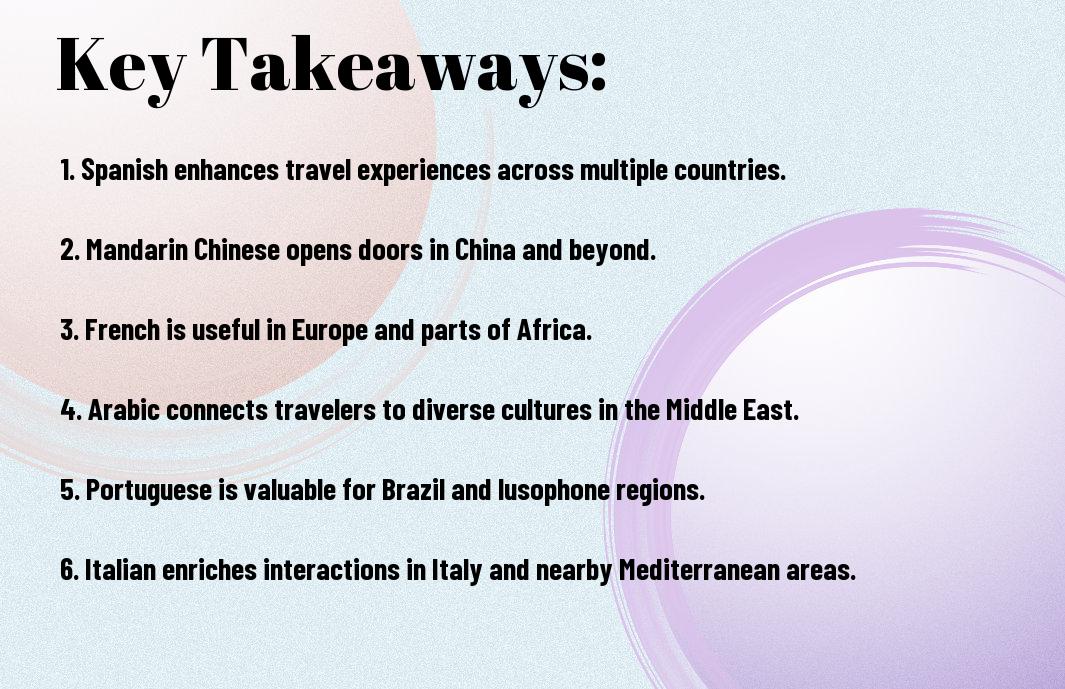As you plan your next international trip, you may wonder which languages will help you navigate foreign countries with ease. Your language skills can greatly impact your travel experience, enabling you to connect with locals and appreciate cultural nuances. You will find that learning the right languages can unlock new destinations and experiences, making your travels more enjoyable and immersive.
Key Takeaways:
To thrive as a global traveler, it’s important to understand the most effective languages to learn. Here are three key points to consider:
- Learning Spanish can significantly enhance travel experiences in Central and South America, as well as Europe, due to its widespread use and cultural significance.
- Understanding Mandarin Chinese can provide global travelers with a competitive edge, particularly in Asia, where it is the most widely spoken language and a key component of international business.
- Becoming proficient in Arabic can open doors to Middle Eastern and North African cultures, offering travelers unparalleled opportunities to engage with local communities and appreciate the region’s rich heritage.
Essential Languages for Globetrotters
Your travel experiences can be greatly enhanced by learning the local languages of the countries you visit, allowing you to connect with the culture and people on a deeper level.
Spanish for South America and Europe
Around 460 million people speak Spanish, making it a valuable language to learn for travel to South America and Europe, enabling you to communicate effectively and navigate your way through these regions with ease.
Arabic for the Middle East and North Africa
African and Asian countries have a significant number of Arabic speakers, and learning this language will open doors to rich cultural experiences and history in the Middle East and North Africa, allowing you to engage with the local population.
Languages like Arabic can be challenging to learn, but the benefits of speaking it will make your travels to the Middle East and North Africa much more enjoyable, as you’ll be able to appreciate the local customs, read signs and menus, and interact with the friendly locals who will appreciate your effort to communicate in their language.

Languages for the Asian Trail
Clearly, Asia offers a diverse array of languages to learn, each with its own unique benefits for travelers. You can navigate multiple countries with knowledge of a single language, making your journey more enjoyable and immersive.
Mandarin Chinese for China and Taiwan
Between the lines of cultural and linguistic heritage, you’ll find Mandarin Chinese to be an invaluable asset for your travels in China and Taiwan, enabling you to connect with locals and explore hidden gems.
Japanese for Japan and East Asia
Comparable to Chinese in terms of its complexity and beauty, Japanese is a highly sought-after language for travelers visiting Japan and other parts of East Asia, where you can discover vibrant cities and traditional landscapes.
Asian cultures are notoriously polite and respectful, and as you examine into the world of Japanese language, you’ll find that learning key phrases and vocabulary will enhance your travel experience, allowing you to engage with your surroundings and the people you meet, making your journey even more unforgettable and personally fulfilling for you.
European Languages for the mains
Unlike other continents, Europe offers a diverse array of languages, making it crucial to choose the right one for your travels. You’ll find that speaking the local language can enhance your experience and allow you to connect with the culture on a deeper level.
French for Western Europe
Beneath the surface of Western Europe lies a rich cultural heritage, and learning French will give you access to this world. You’ll be able to navigate France, Belgium, and Switzerland with ease, and your language skills will be appreciated by the locals.
German for Central and Eastern Europe
Among the languages spoken in Central and Eastern Europe, German stands out as a valuable asset for travelers. You’ll find that speaking German will open doors to Austria, Germany, and parts of Switzerland, allowing you to explore these regions with confidence.
Considering your travel plans, learning German will also give you a deeper understanding of the history and culture of Central and Eastern Europe. You’ll be able to engage with the locals, try authentic cuisine, and visit popular attractions without language barriers, making your travel experience even more enjoyable and rewarding.

Language Learning Tips for Travelers
Many travelers find language learning to be a challenging task. Here are some tips:
- Set achievable goals
- Practice consistently
. Knowing your learning style will help you choose the most effective method.
Immersion and Language Schools
Towards improving your language skills, consider enrolling in a language school or immersing yourself in the local culture, which will help you learn faster and more effectively.
Online Resources and Language Apps
Between language learning apps and online courses, you have a wide range of options to choose from, allowing you to learn at your own pace and convenience.
Even with the numerous online resources available, you can still find the most suitable one for your needs by trying out a few and selecting the one that best fits your learning style and goals, helping you to stay motivated and engaged throughout your language learning journey.
Cultural Insights and Language Nuances
After immersing yourself in a new language, you’ll discover the nuances that shape your interactions with locals, revealing a richer travel experience as you navigate unfamiliar territories.
Non-Verbal Communication and Customs
Around every corner, you’ll encounter unique non-verbal cues and customs that can significantly impact your interactions, and being aware of these differences will help you communicate more effectively and avoid unintentionally offending locals.
Local Dialects and Slang
Similarly to customs, local dialects and slang can vary greatly, and understanding these variations will enhance your travel experience, allowing you to connect with locals on a deeper level and appreciate the diversity of the language you’re learning.
But as you research deeper into local dialects and slang, you’ll find that they often convey subtle shades of meaning and context that can completely change the tone of a conversation, and being able to pick up on these nuances will make you a more confident and engaging traveler, capable of navigating even the most unfamiliar situations with ease and poise, and you’ll be better equipped to express yourself and understand the culture in a more authentic way.
Language Challenges and Rewards
Despite the difficulties, learning a new language can be rewarding. You can discover the 14 Best Languages to Learn for Travel and enhance your travel experiences.
Overcoming Language Barriers
Besides the initial struggles, you will find that learning a language helps you navigate foreign countries with ease, allowing you to engage with locals and immerse yourself in their culture.
Enhancing Travel Experiences through Language
Linguistically, you will be able to appreciate the nuances of foreign cultures, from reading signs and menus to understanding the history and customs of the places you visit.
Barriers to communication will fade away as you learn to speak and understand the local language, enabling you to have a more authentic and enjoyable travel experience, and you will be able to make the most of your time abroad, exploring new destinations and forming meaningful connections with the people you meet along the way.
Final Words
Hence, as you initiate on your global travels, you’ll find that learning the best languages will enhance your experience. You can discover the Most Useful Languages for World Travel to better navigate foreign lands. Your language skills will bridge cultural gaps, allowing you to fully immerse yourself in your destinations and create lasting connections with the people you meet.
FAQ
Q: What are the most widely spoken languages that I should consider learning for global travel?
A: As a global traveler, learning languages such as English, Mandarin Chinese, Spanish, Arabic, and French can significantly enhance your travel experiences. English is widely spoken in many countries and is often the language of international communication. Mandarin Chinese is the most spoken language in the world, with a large number of native speakers, while Spanish and Arabic are official languages in many countries across the globe. French is also widely spoken, particularly in Europe and parts of Africa. Learning any of these languages will facilitate communication and deepen your cultural connections during your travels.
Q: How can learning a foreign language impact my travel experiences and interactions with local cultures?
A: Learning a foreign language can profoundly impact your travel experiences by allowing you to engage more deeply with local cultures. When you speak the local language, you can navigate more easily, read signs and menus, and communicate with locals, which can lead to more authentic interactions and a richer cultural understanding. It also shows respect for the culture and people you are visiting, often leading to warmer welcomes and more meaningful connections. Furthermore, language skills can open up opportunities for unique experiences, such as homestays, local volunteer work, or participation in cultural events, which might not be accessible otherwise.
Q: Are there any language learning resources or tips that can help me learn a language quickly and effectively for my travels?
A: Yes, there are numerous resources and tips that can help you learn a language quickly and effectively for travel. Utilizing language learning apps like Duolingo, Rosetta Stone, or Babbel can provide structured lessons and interactive exercises. Immersion is also a powerful tool; watch local movies, listen to music, and try to find a language exchange partner. Focus on learning key phrases and vocabulary related to travel, such as directions, food, and basic greetings. Additionally, consider enrolling in a language course or hiring a tutor for personalized feedback. Lastly, practice consistently, even if it’s just for a few minutes each day, to build your language skills and confidence before your trip.

